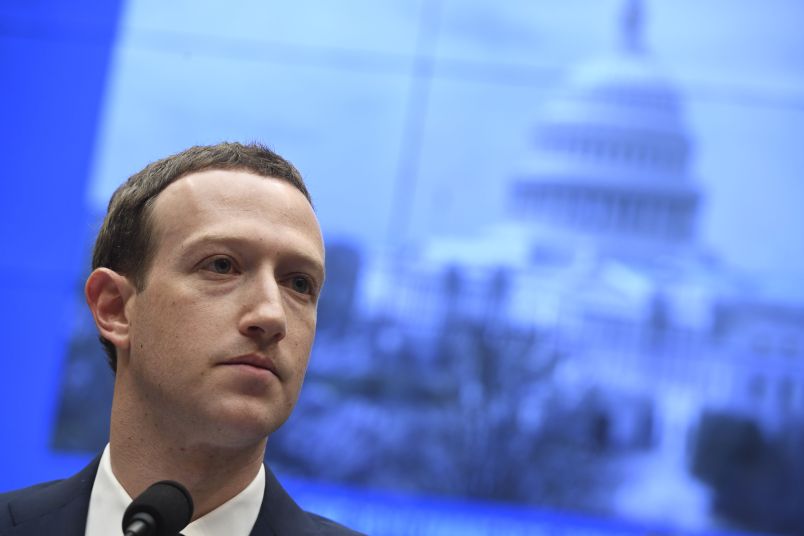WASHINGTON (AP) — Facebook CEO Mark Zuckerberg told a House oversight panel Wednesday that he believes it is “inevitable” there will be regulation of the social media industry and also disclosed to lawmakers that his own data was included in the personal information sold to malicious third parties.
“The internet is growing in importance around the world in people’s lives and I think that it is inevitable that there will need to be some regulation,” Zuckerberg said during testimony before the House Energy and Commerce Committee. “So my position is not that there should be no regulation but I also think that you have to be careful about regulation you put in place.”
Larger, more dominant companies like Facebook have the resources to comply with government regulation, he said, but “that might be more difficult for a smaller startup to comply with.”
Lawmakers in both parties have floated possible regulation of Facebook and other tech companies amid privacy scandals and Russian intervention on the platform. It’s not clear what that regulation would look like and Zuckerberg didn’t offer any specifics.
Zuckerberg was answering a question from Rep. Anna Eshoo, D-Calif., when he informed lawmakers about his personal data, a reference to the Cambridge Analytica scandal that has rocked his company over the past several weeks.
His remarks came as he opened the second day of a congressional inquisition in the wake of the worst privacy debacle in his company’s history. A day earlier Zuckerberg batted away often-aggressive questioning from senators who accused him of failing to protect the personal information of millions of Americans from Russians intent on upsetting the U.S. election.
The stakes are high for both Zuckerberg and his company. Facebook has been reeling from its worst-ever privacy failure following revelations last month that the political data-mining firm Cambridge Analytica, which was affiliated with Trump’s 2016 campaign, improperly scooped up data on about 87 million users. Zuckerberg has been on an apology tour for most of the past two weeks, culminating in his congressional appearances this week.
Rep. Greg Walden, R-Ore., the committee chairman, asked Zuckerberg if it ever crossed his mind several years ago when user data was being extracted from Facebook “that you should be communicating more clearly with users that Facebook is monetizing their data.” Information about users “is probably the most valuable thing about Facebook,” Walden added.
Zuckerberg said that Facebook allows people to decide whether and how they want their information shared. But he said his company “can do a better job of explaining how advertising works.”
After a testy exchange with Zuckerberg, Rep. Diana DeGette, D-Colo., said Congress should consider imposing “really robust penalties” for social media companies that repeatedly compromise user information.
“We continue to have these abuses and these data breaches,” DeGette said. “But at the same time it doesn’t seem like future activities are prevented.”
During roughly five hours of Senate questioning on Tuesday, Zuckerberg apologized several times for Facebook failures, disclosed that his company was “working with” special counsel Robert Mueller in the federal probe of Russian election interference and said it was working hard to change its own operations after the harvesting of users’ private data by a data-mining company affiliated with Donald Trump’s campaign.
Seemingly unimpressed, Republican Sen. John Thune of South Dakota said Zuckerberg’s company had a 14-year history of apologizing for “ill-advised decisions” related to user privacy. “How is today’s apology different?” Thune asked.
As for the federal Russia probe that has occupied much of Washington’s attention for months, he said he had not been interviewed by special counsel Mueller’s team, but “I know we’re working with them.” He offered no details, citing a concern about confidentiality rules of the investigation.
Earlier this year Mueller charged 13 Russian individuals and three Russian companies in a plot to interfere in the 2016 presidential election through a social media propaganda effort that included online ad purchases using U.S. aliases and politicking on U.S. soil. A number of the Russian ads were on Facebook.
Much of the effort was aimed at denigrating Democrat Hillary Clinton and thereby helping Republican Trump, or simply encouraging divisiveness and undercutting faith in the U.S. system.
Zuckerberg said Facebook had been led to believe Cambridge Analytica had deleted the user data it had harvested and that had been “clearly a mistake.” He said Facebook had considered the data collection “a closed case” and had not alerted the Federal Trade Commission. He assured senators the company would handle the situation differently today.
In the hearings, Zuckerberg is trying to both restore public trust in his company and stave off federal regulations that some lawmakers have floated.
Democrat Bill Nelson of Florida said on Tuesday that he believes Zuckerberg was taking the congressional hearings seriously “because he knows there is going to be a hard look at regulation.”
Republicans have yet to get behind any legislation, but that could change.
Sen. Lindsey Graham, R-S.C., asked Zuckerberg if he would be willing to work with lawmakers to examine what “regulations you think are necessary in your industry.” Absolutely, Zuckerberg responded.
At both the House and Senate hearings, Zuckerberg said: “We didn’t take a broad enough view of our responsibility, and that was a big mistake. It was my mistake, and I’m sorry. I started Facebook, I run it, and I’m responsible for what happens here.”
He outlined steps the company has taken to restrict outsiders’ access to people’s personal information. He also said the company is investigating every app that had access to a large amount of information before the company moved to prevent such access in 2014 — actions that came too late in the Cambridge Analytica case.






